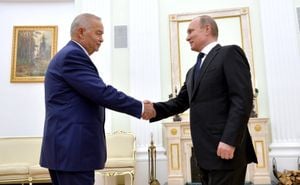U.S. President Donald Trump has stirred controversy with his recent statements about the Ukraine War, accusing Ukrainian President Volodymyr Zelensky of being responsible for the Russian invasion, which many experts deem historically inaccurate and misleading.
Trump's provocative remarks came during several appearances around February 19 and 20, 2025, where he declared, "You should never have started the war. You could have made a deal." He sharply criticized Zelensky, characterizing him as a "dictator" and blaming him for allowing the conflict to escalate. This narrative aligns suspiciously with long-standing Russian propaganda tactics aimed at discrediting Ukraine’s leadership.
Elmar Theveßen, ZDF Correspondent, highlighted the gravity of Trump's distortion, stating, "Trump's statement is complete distortion of history," underscoring the factually wrong nature of Trump's claims about Zelensky's governance. Theveßen pointed out the irony of Trump adopting rhetoric previously put forth by Russian President Vladimir Putin, who has consistently cast blame on Ukraine for the tensions stemming from the invasion.
Notably, Trump's assertions come as Zelensky continues to lead Ukraine with public support, having been elected with over 70% of the vote back in 2019. This fact stands starkly against Trump's claims, which Ukrainian journalist Denis Trubetskoy has critiqued as dangerous and damaging to the Ukrainian nation as it grapples with conflict and sovereignty.
Political scientists such as Jana Puglierin remarked on the historical ties between Trump's presidency and Ukraine's leadership. She noted the unfavorable relationship stemming from Trump's first term, which began with his controversial phone call to Zelensky—widely considered the trigger for Trump’s impeachment proceedings. This backdrop complicates Trump's critique of Zelensky, as it reflects personal grievances combined with geopolitical calculations.
To contextualize the hostility Trump has expressed, Theveßen referenced conversations held during the Munich Security Conference, wherein serious discussions about Ukraine's precarious state unfolded. He relayed how, per unknown sources, the discussion featured Ukrainian Finance Minister Scott Bessent presenting Ukraine with contracts perceived by some as disadvantageous, illustrating the potential exploitation inherent within U.S.-Ukraine negotiations.
Reactions to Trump's public declarations have also found their way to Ukrainian officials. Andrij Melnyk, the former ambassador of Ukraine to Germany and now serving as Ukraine's envoy to Brazil, emphasized the necessity for American support against Russian aggression. He remarked, "We cannot turn against the Americans because we need them. They have been our number one allies since the onset of the war." Melnyk's appeal stresses the importance of coherent alliances amid troubling political expressions across the Atlantic.
Further dissecting Trump's comments, the ZDF team’s fact-check confirmed the inaccuracies embedded within them. Trump once stated, "You are not going to have a country if you don’t act fast," alluding to alleged plummeting approval ratings for Zelensky at four percent. This claim was quickly discredited, with legitimate data reflecting approval ratings much higher than Trump suggested.
Such misrepresentations contribute to wider narratives where misinformation thrives; Trump's irresponsible rhetoric has the potential to confuse alliances and weaken the resolve against Russia's actions. ZDF’s political analysts critiqued the long-term impacts of such statements, arguing it could lead to disjointed European support for Ukraine at a time when solidarity is urgently needed.
The perception of the Ukraine crisis has evolved, becoming entangled with both historical grievances and current political narratives. Analysts view Trump’s reliance on Russian rhetoric as emblematic of self-serving politics rather than viable solutions for peace. U.S. political discourse is now influenced by echoing Trump’s distortions, placing democratic governance values at odds with authoritarian leanings.
What remains central, according to experts, is the need for accountability and clear communication—both within the U.S. and on the European stage. Misleading narratives propagated during harsh geopolitical struggles could undermine public faith and international support, elements critically needed to stabilize Ukraine during the conflict.
While figures like Trump may deviate from historical truths, the Ukrainian resolve continues to garner respect among its allies. The necessity for diplomacy remains pressing, and the struggle for clarity should take precedence in political dialogues as Ukraine fights for its sovereignty and future against unfounded trials and tragedy.



